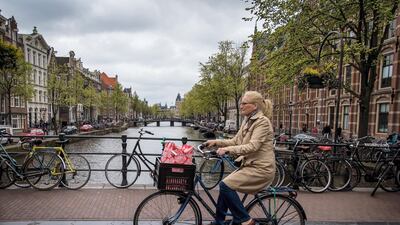Sweet tax deals, a business-friendly climate and an English-speaking population- the Netherlands is going all out to attract companies leaving Britain post-Brexit in search of a new EU-based home.
With less than a year before Britain formally leaves the European Union at midnight on March 29, 2019, the Dutch government has deployed a small army of lobbyists hoping to persuade companies to pick Rotterdam or Amsterdam over Paris or Frankfurt for their new base.
Via the Netherlands Foreign Investment Agency (Nifa), an official arm of the economic affairs ministry, the Dutch government is currently "in touch with more than 200 companies", says spokesman Michiel Bakhuizen.
"These are companies wishing to leave Britain or international businesses who are looking to set up in an EU country, and from now on, have to avoid London."
So far things have been going well, from a Dutch perspective.
Last month the Anglo-Dutch consumer products giant Unilever decided to end its dual-headed legal structure, severing its London base and regrouping around its headquarters in Rotterdam.
The company denied the decision had anything to do with Brexit, but that didn't lessen the blow to the British.
And Amsterdam is now preparing for the arrival of the European Medicines Agency (EMA), after winning a hard-fought battle against Milan to be the new home of the EMA and its 900 staff when it leaves London next year.
Dutch officials say they have a good case. The Netherlands has a modern infrastructure, good digital and communications providers, and 90 per cent of the population speaks English.
"We're no island," the Nifa says somewhat snidely on it website. "We're on the continent, close to Europe's 500 million consumers, not to mention your business customers."
Roel Beetsma, an economist from the University of Amsterdam, agreed, saying the country has "a good business climate, encouraged by government measures, a good level of education, a high quality of life and a central place in the heart of Europe with a focus on the international".
Three successive governments led by business-friendly Prime Minister Mark Rutte have already made the country attractive for investors and those seeking to draw international talent.
_______________
Read more:
UK business chiefs less concerned about Brexit
Arnie's back: Terminator star urges Britons to make claims over wrongly sold insurance
_______________
"Business taxes and the 30 per cent tax reduction rule for qualified expats are advantageous," says Mr Bakhuizen, Brexit spokesman at the ministry for economic affairs.
To those still hesitating, the NIFA promises "we roll out the orange carpet," vowing it is a "one-stop-shop" with "tailor-made" guidance for companies wanting to establish or expand in Europe.
In 2017, 18 companies chose the Netherlands "for reasons linked to Brexit", says Mr Bakhuizen.
Many international firms' employees have been seduced by Amsterdam's picturesque canals and its Zuidas business district, easily reached by train or from Schiphol airport.
The financial sector is the city's most important, representing 25 per cent of the local economy and providing 255,000 jobs, about 19 per cent of the total workforce, according to the municipality.
More than 50 European and international banks currently call Amsterdam home to their branches or subsidiaries. They were joined in September by the Japanese mega-bank Mitsubishi UFJ Financial Group (MUFG) which chose the Dutch capital over Paris as the European headquarters of its brokerage activities.
"We have great digital connectivity," adds Vera Al, spokeswoman for the city's deputy mayor Udo Kock.
"We have a big creative and tech hub," she says, adding that was "the reason why Booking.com, Netflix, Facebook, Uber and Google have offices in Amsterdam".
Uber, Netflix and Amazon also recently announced they were expanding their Amsterdam bases, hiring hundreds of new staff.
But with the city already overcrowded, some analysts fear it could struggle to provide office space and housing. Dutch officials however point to other big cities, such as Rotterdam, all linked by highly-efficient public transport.
And as Brexit approaches the Dutch are not sitting on their laurels.
"We want to attract the most companies possible," says Mr Bakhuizen, insisting contacts with international business have been stepped up.
After the 2016 Brexit vote, the Nifa swiftly boosted its team, taking on six more staff - two based in London, two in The Hague and two in the United States.
"But we work in the proper way," Mr Bakhuizen says, adding "we don't want to act like vultures" circling their prey.

